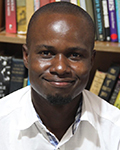2017
(Yusuf) Joseph Kajura Serunkuma
- Doctoral Student
- Makerere University

Abstract
Exploiting the craft and aesthetics of popular culture in Hargeisa, this study examines the ways in which Somaliland nationalism—as an independent state—is mobilised after the 1991 civil war. Focused on questions relating to history, identity and aspirations, this study argues broadly that Somaliland is constructed as a foil for Somalia in every aspect of its new imaginary: In its secessionist state, Somaliland is crafted as representative of (a) a strict Islamic public identity (b) victims of a failed pan-Somali nationalist project, and (c) a developmental state that is also democratic. Through a performative and textual analysis of popular culture in Hargeisa, Somalia-Mogadishu emerges as a detested but permanent interlocutor. Indeed, although most of scholarship celebrates the over 25 years of peace and stability in Somaliland, sustaining the images and histories of violence and victimhood in its political, performative and institutional symbolisms suggests a country still at war.

